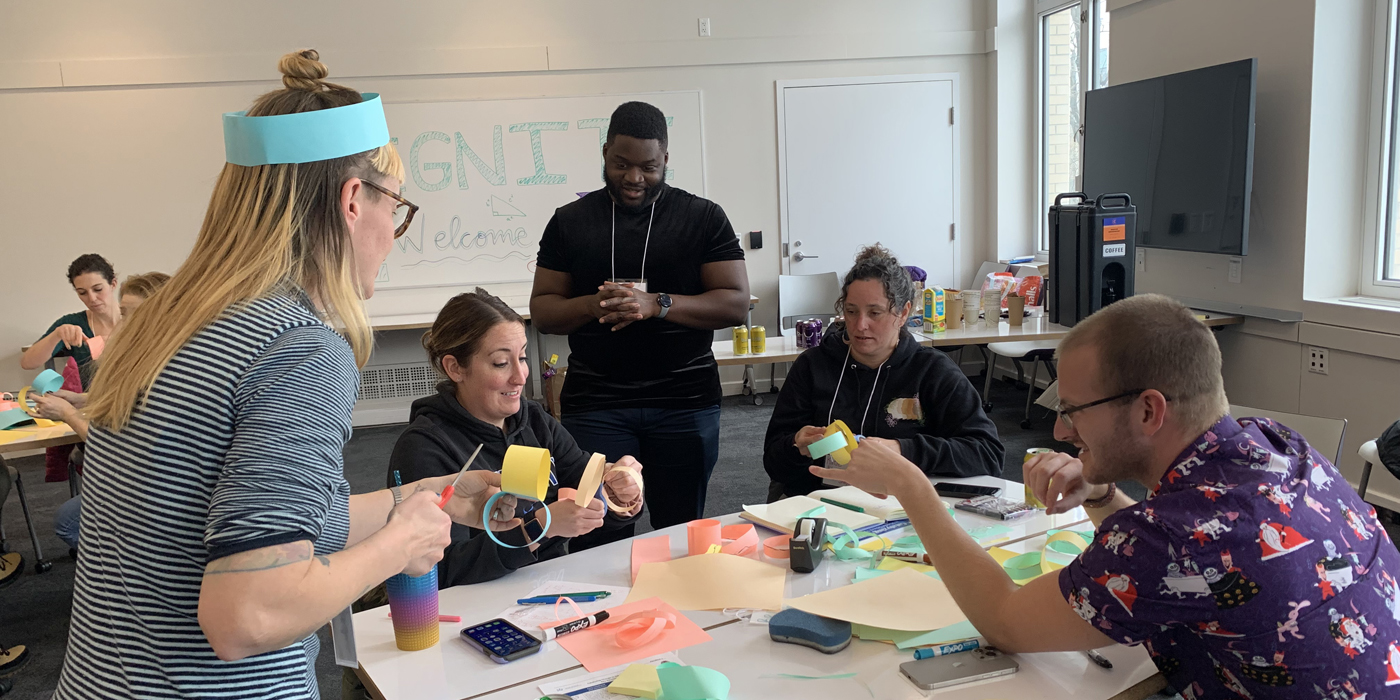Program Aims To Ignite K-12 Students’ Relationship to Math
By Ann Lyon Ritchie
Media Inquiries- Interim Director of Communications, MCS
- 412-268-9982
Being a mathematician is hard to imagine for many young students.
“When I talk with K-12 teachers, they talk about their students having a very low STEM identity, meaning that being involved in STEM or doing well in STEM isn’t something that the students believe they can do,” said Michael Young, associate professor of mathematical sciences and associate dean for diversity, equity and inclusion in Carnegie Mellon University’s Mellon College of Science.
Young galvanized the mathematics community to offer the Ignite Students’ Mathematical Identities workshop for K-12 math teachers. During the three-part workshop, which included two virtual sessions and a daylong intensive held on Feb. 18 at Carnegie Mellon, participants from 20 schools in the Pittsburgh region heard the stories of diverse voices of mathematicians and worked on the development of classroom lessons and activities to make advanced mathematics more approachable to the K-12 audience.
Multiple talents coalesced from the broad mathematics community.
“If it were baking, I put the recipe together, but I wasn’t in the kitchen at all,” Young said.
Carnegie Mellon doctoral student Cat Raanes served as project coordinator. Former postdoctoral teaching fellow Noel Bourne and current postdoctoral teaching fellow Hayley Olson led the grant writing efforts that led to the Grable Foundation providing a $15,000 grant to support the project for one year.
Young worked with mathematics scholars Selvi Kara and Padi Fuster, who co-founded the Meet a Mathematician website and video series and had been discussing with him how to develop lesson plans for schools. Meet a Mathematician shares the stories of mathematicians from diverse backgrounds with the aim of introducing students to role models and fostering a sense of community.
The website features short videos of mathematicians discussing their careers, struggles and accomplishments.
“They have done amazing things,” said Kara.
“When we’re working with teachers, we’re going to reach more students. Being able to empower students is just good for all of us.” — Michael Young
Spotlighting Diverse Mathematicians
Kara and Fuster first started recording interviews with mathematicians in 2020 after being unable to find suitable videos of women mathematicians to discuss with girl-focused math clubs.
“It was not just a problem for women but also for mathematicians of color and from marginalized groups,” Kara said.
Over 100 videos are available on their YouTube channel.
Fuster, who is a fellow in the National Science Foundation’s Mathematical and Physical Sciences Ascending Postdoctoral Research Fellowship (MPS-Ascend) program, said that she and Kara share an interest in wanting to make the mathematics community more accessible.
“We heard many stories about how people didn’t realize the career opportunities in math until later in life, only after they were exposed to advanced mathematics in college,” Fuster said.
Inspiring Discussions and Change
For help connecting the Meet the Mathematician videos to the educational goals of the Ignite workshop, Young reached out to Anne Marie Marshall, a research and evaluation team leader at the University of Wisconsin-Milwaukee.
Marshall led and developed the instructional aspects of the Ignite workshops based on the National Council of Teachers of Mathematics’ book series Catalyzing Change, which she said offers ways to initiate critical conversations for improving mathematics education for every student.
“The books served as a foundation for our learning as we connected to the videos,” said Marshall, a co-author of the early childhood and elementary book.
Surveying the Ignite participants, Marshall noted that community-building in mathematics was a benefit reported by the teachers, along with access to new tools for the classroom.

During the February workshop, teachers heard the stories of diverse voices of mathematicians.
Applying Diverse Perspectives To Empower Schools
Algebra teacher Brittany Keesecker participated in the Ignite workshop with several colleagues from Pittsburgh Science and Technology Academy.
“The in-person learning opportunity resurfaced our joy of teaching mathematics and inspired several lesson plans that were implemented at our school, in various classrooms from sixth through 12th grades,” Keesecker said.
Keesecker said the workshop highlighted the importance of community, visibility and representation of various perspectives in mathematics education.
“Overall, the workshop and mathematicians added resources, inspiration and lesson plan ideas to continue propelling our professional development toward more equitable, collaborative and inclusive classrooms,” Keesecker said.
Through participating in programs like this and hosting the Summer Undergraduate Applied Mathematics Institute, Carnegie Mellon’s Department of Mathematical Sciences and the Mellon College of Science seek to build an inclusive and diverse community that brings together a wealth of perspectives, identities, backgrounds and cultures where every individual is treated with respect and empathy.
“When we’re working with teachers, we’re going to reach more students,” Young said. “Being able to empower students is just good for all of us.”